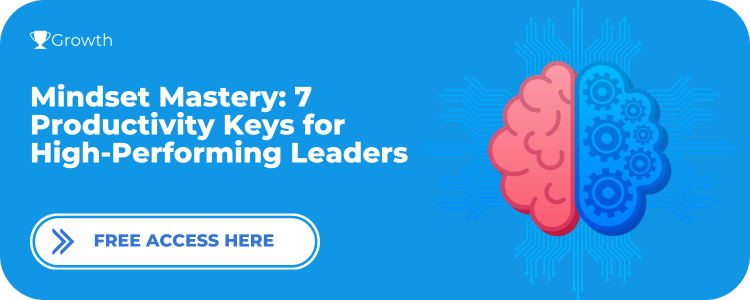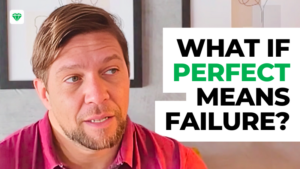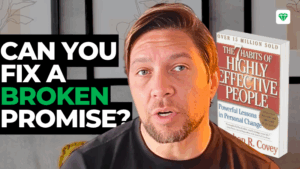✅ FREE ACCESS: Mindset Mastery: 7 Productivity Keys For High-Performing Leaders
Welcome to the third part of our series of 13 Habits of successful entrepreneurs inspired by Napoleon Hill’s ‘Think and Grow Rich.’
In addition to the 9 habits explored in the previous episodes, today, we’re going to learn the last 4 of these 13 success habits and a step-by-step process to start cultivating them now.
Mindset Mastery: 7 Productivity Keys for High-Performing Leaders.
This is your chance to develop the 7 mindset keys of the world’s most successful leaders to achieve extraordinary results.
Habit #10: The Mystery of Sex Transmutation
The 10th of the 13 habits of successful entrepreneurs is The Mystery of Sex Transmutation.
To begin, let’s clarify what we mean by “sex transmutation.”
In simple terms, it refers to redirecting the tremendous power of sexual energy toward other creative and productive endeavors.
By doing so, we unlock a wellspring of imagination, courage, willpower, persistence, and creative ability that remains dormant otherwise.
Napoleon Hill wrote:
“Sex desire is the most powerful of human desires. When driven by this desire, men develop keenness of imagination, courage, willpower, persistence, and creative ability unknown to them at other times.”
He highlighted three potentialities of sex:
- The perpetuation of mankind.
- The maintenance of health.
- The transformation of mediocrity into genius through transmutation.
It is a force so strong that it awakens qualities within us that we rarely experience otherwise.
How to apply
Our minds respond to various stimuli, triggering heightened states of enthusiasm, creative imagination, and intense desire.
Napoleon Hill identified ten stimuli that elicit powerful responses, with sex ranking as the number one trigger:
- The desire for sex expression.
- Love.
- A burning desire for fame, power, or financial gain.
- Music.
- Friendship.
- A Master Mind alliance.
- Mutual suffering.
- Auto-suggestion.
- Fear.
- Narcotics and alcohol.
In Chapter 11 of “Think and Grow Rich,” Napoleon Hill introduces the concept of a genius—a person capable of tapping into extraordinary levels of knowledge and insight.
This ability arises from increasing the vibrations of thought through the sixth sense, also known as creative imagination.
Genius ideas stem from various sources, including:
- Infinite Intelligence.
- The subconscious mind.
- Conscious thoughts of others.
- Subconscious thoughts of others.
That creative imagination can be trained and enhanced, but only through consistent exercise.
The evidence supporting this faculty’s existence and voluntary control is well documented.
Take, for example, inventor Mr. Gates, who relied on a three-step process to access his creative faculty:
- Stimulate your mind using one or more of the ten stimuli we mentioned earlier.
- Concentrate on the known and unknown factors, holding the picture in your mind until it dominates your subconscious.
- Finally, relax and clear your mind, allowing the answer to flash into your consciousness.
Now that you understand the power of sex transmutation and its potential for unlocking your genius, it’s time to put this knowledge into action.
By redirecting your sexual energy towards creative pursuits, you can tap into a well of inspiration, resilience, and success.
Habit #11: The Subconscious Mind
The 11th of the 13 habits of successful entrepreneurs is The Subconscious Mind.
According to Napoleon Hill, the Subconscious Mind is a powerful force that plays a crucial role in shaping our thoughts, beliefs, and actions.
In ‘Think and Grow Rich,’ Hill explains:
“The subconscious mind consists of a field of consciousness in which every impulse of thought that reaches the objective mind through any of the five senses is classified and recorded.”
You cannot entirely control your subconscious mind.
Nevertheless, you can voluntarily choose what it should work with by following the habit of autosuggestion we discussed in the previous episode.
Emotions are considered the catalyzer to quickly access your subconscious mind.
The positive emotions you should master to fill your mind with them to develop money consciousness are:
- Desire.
- Faith.
- Love.
- Sex.
- Enthusiasm.
- Romance.
- Hope.
The negative emotions that must be rejected are:
- Fear.
- Jealousy.
- Hatred.
- Revenge.
- Greed.
- Superstition.
- Anger.
How to apply
Positive and negative emotions cannot occupy the mind at the same time.
One or the other must dominate. It is your responsibility to make sure that positive emotions constitute the dominating influence of your mind.
Here the law of HABIT will come to your aid.
Form the habit of applying and using positive emotions!
Eventually, they will dominate your mind so completely, that the negatives cannot enter it.
Here are 3 steps to develop the habit of channeling positive emotions and avoiding negative ones.
Step #1: Awareness and belief examination
Begin by cultivating awareness of your thoughts, beliefs, and self-talk.
Take time to examine the beliefs you hold about yourself and others in different situations.
Step #2: Reprogramming the Subconscious Mind using journaling
Use journaling to write about your positive and negative emotions as a way to pour them out of your mind and understand exactly what triggers those emotions.
I talk more about a step-by-step process you can use to start journaling today in the [5 Reasons Why Procrastination is Good For You.]
The link is in the description.
Step #3: Reprogramming the Subconscious Mind using afformations
Use afformations instead of affirmations as an autosuggestion tool to reprogram your subconscious mind.
Afformations are empowering questions intended to change your subconscious thought patterns from negative to positive.
Noah St. John is considered the father of afformations. In the [Book of Afformations] he outlines the affirmation method:
- Identify what positive emotion, skill, or belief you want to achieve and write it down.
- Turn that into a wh-question (what, why, when, where)
- Make a list of these afformations.
- Ask yourself one question on your list every day.
The idea behind afformations is to throw questions into your subconscious mind, let it delve into them, and bring that back to your conscious mind in the form of cues, interests, and desires.
I keep a list of 20 afformations on my phone’s notes app.
Here are 3 of them that might inspire you:
- Why am I so good at helping others?
- Why do I have the courage to do what I love?
- Why am I so consistent and take action to complete any task?
By implementing these steps and working closely with your Subconscious Mind, you can tap into its immense power and create profound shifts in your life.
In the Mindset Mastery Workbook, I present 7 mindset keys to becoming a top-performing leader. All are based on science with step-by-step processes for every mindset key. The link is in the description.
Habit #12: The Brain
The 12th of the 13 habits of successful entrepreneurs is called The Brain.
According to Napoleon Hill, the Brain acts as a powerful broadcasting and receiving station that connects our thoughts and desires with the larger universe.
He explains that:
“Every human brain is capable of picking up vibrations of thought which are being released by other brains.”
He believed that our thoughts and desires are transformed into vibrational energy that can be transmitted and received by the brains of others.
We can say that by understanding how the brain functions as a broadcasting and receiving station, we can learn to harness its power and align our thoughts with our goals and desires.
How to apply
It is important to keep in mind the Think and Grow Rich book was written in 1937, and at that time science was not as developed as today.
At that time some pseudo-sciences like phrenology were in vogue, and occult sciences were certainly widespread
So, we’re going to outline an actionable and creative implementation process from Hill’s insights and also more recent related research.
Step 1: Be mindful of brain exposure.
Surround yourself with people, environments, and resources that support your goals and aspirations.
Engage in conversations, read books, and listen to audio that uplifts and inspires you.
By immersing yourself in positive influences, you enhance the vibrational frequency of your Brain and attract like-minded individuals and opportunities.
That’s not a mystical approach. That’s purely psychophysiological.
Exposing your brain to sounds, images, smells, and other stimuli that are misaligned with the attainment of your goals will influence how your brain functions and, therefore, your chances of success.
Negative thoughts or feelings that seem to come from nowhere are never coming from nowhere.
Be mindful of what you expose your brain to.
Step 2: Practice gratitude and generosity
Gratitude is vital for social beings like us.
Through the course of millions of years of evolution, we have survived and thrived through competition and cooperation with other humans.
That’s so ancient that we have it embedded in our brain functions in a way that we pay an emotional price by not being a useful and reciprocal member of society.
On the other hand, being a useful, grateful reciprocal, and generous member of any given group enhance our brain functions, regulate our emotions, and increase our odds of survival and success.
So, express gratitude for the things you have and the progress you’ve made.
Exercise generosity to your past self that made the choices by which you live today.
Just because things could have been different, it doesn’t mean they could have been better.
So stop assuming that every possible version of your past could have led you to a better place.
That’s pointless.
Because you did what you could with what you had and you learned from it.
You are what you are today, thanks to what you were then, so be grateful.
Without that, you won’t be able to be kind, grateful, and generous toward others.
A lot of people around you want to be in the place that you are now.
Be generous, open, accessible, kind, and useful to others.
Pick your sacrifice.
Step 3: Develop a receptive mindset
Develop a receptive mindset by opening yourself to receive guidance, insights, and opportunities from the world around you.
Trust in the power of your Brain to receive the cues that will support your journey toward success.
If you’re exposing your brain to the proper stimuli, as we just talked about, your mind will pick up the proper cues from the environment and drive interest in the things that push you forward.
The obvious is only obvious to the trained eye.
By implementing these steps and working consciously with the power of your Brain as a broadcasting and receiving station, you can align your thoughts with your desires and attract the resources and opportunities for your success.
Habit #13: The Sixth Sense
The last of the 13 habits of successful entrepreneurs is The Sixth Sense.
In the last chapter of Think and Grow Rich, Napoleon Hill describes the Sixth Sense as the medium through which ideas, plans, and hunches are received from universal intelligence.
He wrote:
“The Sixth Sense is that portion of the subconscious mind which has been referred to as the Creative Imagination. It has also been referred to as the ‘receiving set’ through which ideas, plans, and thoughts flash into the mind. The ‘flashes’ are sometimes called ‘hunches’ or ‘inspirations.’”
It is through this heightened perception that individuals can gain insights, make accurate decisions, and receive guidance that goes beyond ordinary knowledge and reasoning.
How to apply
We can make a purely psychological case for that as well.
The brain is a pattern-detection machine. That’s why we have memory.
Memory is not about remembering the past. Memory is about finding patterns of behavior in the stories we lived to make a better case of survival for the future.
The idea of a sixth sense comes from that pattern detection mechanism grounded in memory that tells us that a moving bush on a not winding day might be a sign of a sabertooth preparing its attack and I should move away before it manifests itself.
That hunch can be developed through proper exposure to challenges and the accumulation of knowledge.
The more you know, the more accurate your sixth sense becomes.
But you don’t know the things you don’t do, you only understand them.
To know things, you have to live them and by doing so, you become more than you were before that experience, physically, and cognitively.
Sometimes, you might feel a certain way about a decision even though you can’t explain exactly why.
That’s when the sixth sense, or the pattern detection mechanism, or even, the accumulation of knowledge, experiences, learning, and memory works as a low-resolution level of stimulus to drive you to the best outcome possible.
It’s hard to pack all that up consciously, so you just feel it. You have a hunch, a gut feeling.
Here are 3 hacks to help you develop your sixth sense.
Hack #1: Prime your mind
Develop a morning routine that will prime your mind for a productive day.
Here are a few things I’ve been doing for a few years with great results:
- I get up as soon as I wake up.
- I start listening to an audiobook or podcast as soon as I get up and prepare for the gym.
- I meditate about a current challenge while working out.
- I expose my eyes to a piece of art after the meditation.
- I set a big win for the day.
Hack #2: Own your focus
To provide productive exposure to your brain, you must be mindful and diligent about what you should focus on and when.
A few questions for you to meditate on and adapt to your reality:
- Can you keep your cell phone in silent mode for the whole morning?
- Can you decrease or stop consuming social media?
- Can you decrease or stop watching the news?
- Can you decrease or stop all notifications on your cellphone?
- Can you set a few times during the day to reply to emails and chats?
By Owning your focus, you train your brain to don’t respond to external stimuli as a driver of attention.
Instead, you will feel driven to focus on productive tasks that improve your life in the long run.
In the Mindset Mastery Workbook available in the description, I present an effective time management technique you can start using today and boost your focus.




